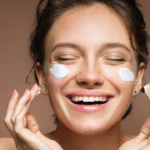Skincare Myths Busted The skincare world is overflowing with advice, trends, and viral hacks—but how much of it is true? In 2025, with cutting-edge technology and deeper dermatological research, it’s time to separate fact from fiction. From natural remedies to expensive serums, this guide will bust the most common skincare myths and give you science-backed truths that actually work.
Understanding Skincare Myths Busted in the Modern Era
Why Do Skincare Myths Spread So Fast?
Social media, influencer marketing, and DIY culture often lead to the spread of skincare misinformation. Many myths are rooted in anecdotal stories or outdated science and are shared without evidence.
The Rise of Skincare Awareness in 2025
With the growth of AI dermatology tools, personalized skincare apps, and ingredient transparency, consumers are more informed than ever—but myths still persist.
Top Skincare Myths Debunked in 2025

Myth #1: “Natural Ingredients Are Always Better”
Reality:
Natural isn’t always synonymous with safe or effective. Poison ivy is natural—but you wouldn’t want it on your skin.
What Works in 2025:
Lab-engineered ingredients like peptides, niacinamide, and ceramides have gone through rigorous testing for safety and efficacy. Many are even more stable and potent than their natural counterparts.
Myth #2: “You Don’t Need Sunscreen on Cloudy Days or Indoors”
Reality:
Up to 80% of UV rays penetrate clouds, and UVA rays can reach your skin through windows.
What Works in 2025:
Broad-spectrum SPF 30 or higher, every day, regardless of weather or location. Blue light protection (from screens) is also a growing area in sunscreen development.
Myth #3: “Oily Skin Doesn’t Need Moisturizer”
Reality:
Skipping moisturizer can trigger the skin to produce even more oil to compensate for dryness.
What Works in 2025:
Lightweight, non-comedogenic gel moisturizers containing hyaluronic acid or glycerin hydrate oily skin without clogging pores.
Myth #4: “Acne Is Caused by Poor Hygiene”
Reality:
Acne is more about genetics, hormones, and skin chemistry—not dirt.
What Works in 2025:
Topical treatments with benzoyl peroxide, salicylic acid, and newer retinoid formulations. AI-guided treatment plans help customize acne solutions.
Myth #5: “You Should Feel a Product Working—Burning Means It’s Effective”
Reality:
A burning sensation is a sign of irritation, not effectiveness.
What Works in 2025:
Formulas with controlled delivery systems that ensure slow release of active ingredients—reducing irritation while maximizing results.
Myth #6: “Anti-Aging Products Are Only for Older People”

Reality:
Prevention is more effective than correction. Starting too late means reversing deeper damage.
What Works in 2025:
Retinoids, peptides, and antioxidants (like Vitamin C) used from the mid-20s can help prevent early signs of aging.
Myth #7: “Pores Can Open and Close”
Reality:
Pores don’t have muscles—they don’t open or close.
What Works in 2025:
Niacinamide, salicylic acid, and professional treatments like laser resurfacing help reduce the appearance of enlarged pores.
Myth #8: “More Products Mean Better Skin”
Reality:
Layering too many products can lead to irritation and compromised skin barriers.
What Works in 2025:
Skinimalism is on the rise—fewer, high-quality products tailored to your skin type. AI diagnostics and personalized kits help minimize unnecessary steps.
Myth #9: “You Can Shrink Pores Permanently”
Reality:
You can’t change your pore size permanently, but you can reduce their visibility.
What Works in 2025:
Using BHA exfoliants, niacinamide serums, and consistent sunscreen use to prevent UV damage that enlarges pores.
Myth #10: “Drinking Water Hydrates Your Skin”
Reality:
Hydration from water intake primarily benefits internal organs before affecting the skin.
What Works in 2025:
Topical hydration (e.g., hyaluronic acid, occlusives) plays a bigger role in maintaining skin moisture than drinking water alone.
Myth #11: “Dark Skin Doesn’t Need Sunscreen”
Reality:
Melanin offers some natural protection but doesn’t block all UV rays. Hyperpigmentation and melanoma are risks for darker skin tones too.
What Works in 2025:
Tinted sunscreens that suit all skin tones and include protection against UVA, UVB, and visible light are game-changers.
Myth #12: “Scrubbing Removes Blackheads”
Reality:
Harsh scrubbing can irritate the skin and worsen inflammation.
What Works in 2025:
Gentle exfoliation with salicylic acid or retinoids, and professional extraction tools guided by dermatologists.
Myth #13: “Anti-Aging Means No Wrinkles at All”
Reality:
Aging is natural, and no product can erase it entirely.
What Works in 2025:
Products aim to slow the signs of aging, improve texture, and support skin health—not eliminate all wrinkles.
Myth #14: “Skincare Results Are Instant”
Reality:
Skincare takes time. Most actives need weeks to show noticeable improvement.
What Works in 2025:
Commit to at least 6-8 weeks with consistent use. Tech-based skin trackers now monitor changes to help measure results over time.
Myth #15: “Expensive Products Are Better”
Reality:
Price doesn’t guarantee efficacy. Some drugstore products outperform luxury brands.
What Works in 2025:
Ingredient transparency and clinical testing outweigh branding. Look for evidence-backed formulas regardless of cost.
What’s New in Skincare That Actually Works in 2025?

AI and Machine-Learning Skincare Diagnostics
Skincare apps and smart mirrors use machine learning to scan skin, detect issues, and recommend personalized regimens. These tools reduce trial and error.
Biotech-Enhanced Ingredients
Peptides, growth factors, and microbiome-balancing ingredients designed via biotech now enhance efficacy and skin compatibility.
Minimalist Skincare Routines
2025 favors simplified routines:
- Cleanser
- Treatment serum
- Moisturizer
- Sunscreen
Less is more—especially for sensitive skin types.
Climate-Smart Skincare
Brands now create region-specific products accounting for local humidity, pollution, and UV exposure. Custom routines based on geography are becoming the norm.
Blue Light and Pollution Protection
Formulations now guard against digital and environmental stressors, reducing oxidative damage and premature aging.
Also Read : Protect Your Skin : Best Essential Skincare Tips For Winter
Conclusion
In 2025, skincare is not about hype—it’s about knowledge, science, and personalization. Myths that once guided beauty routines are being replaced by clinically-proven truths. Whether it’s debunking the myth that natural equals better or reinforcing the importance of sunscreen every day, the future of skincare is informed, tech-driven, and inclusive. By recognizing what actually works, you empower your skin to look and feel its best—now and in the long run.
FAQs
Q1: How can I know if a skincare myth is false?
Check for:
- Scientific studies
- Board-certified dermatologist opinions
- Evidence-based skincare brands
- Credible medical websites (like Mayo Clinic or AAD)
Q2: What’s the biggest myth still believed in 2025?
That sunscreen isn’t necessary indoors or on cloudy days. UV damage occurs year-round, regardless of location.
Q3: Should I follow what influencers say about skincare?
Not always. Influencers may not have dermatological expertise. Always cross-check with dermatologists or medical sources.
Q4: How do I build a skincare routine that works?
Start with:
- Gentle cleanser
- Treatment for your specific concern
- Moisturizer
- Broad-spectrum sunscreen
Optional: Night treatments like retinoids or exfoliants 2–3 times/week.
Q5: Can skincare completely stop aging?
No. It can slow down signs of aging and improve skin health, but nothing stops the aging process entirely.
Q6: Are skincare apps reliable?
Yes, in 2025 many apps are powered by AI and dermatological input. While they’re not replacements for doctors, they provide valuable insights for routine building.
Q7: Is it safe to mix products with active ingredients?
Be cautious. For example:
- Avoid mixing retinol with AHAs/BHAs unless advised by a professional.
- Use Vitamin C in the morning, retinol at night.
Q8: Do men and women need different skincare?
Not necessarily. Skin needs vary by type, concern, and environment, not gender. Many formulations are now unisex.
Q9: Can I skip skincare if I have good genetics?
Genetics help, but lifestyle, pollution, and UV exposure still damage skin. A basic skincare routine is beneficial for everyone.
Q10: What’s the future of skincare beyond 2025?
Expect:
- DNA-based skincare customization
- Microbiome-focused products
- Regenerative ingredients from stem cells
- Increased use of wearable skin diagnostics




